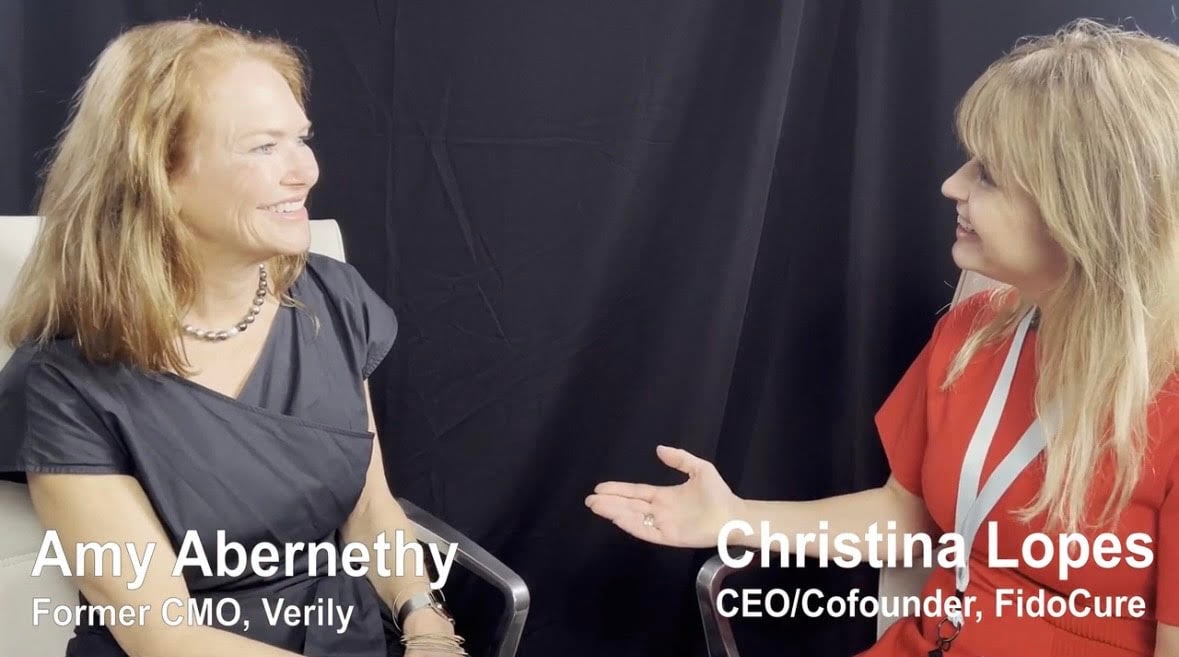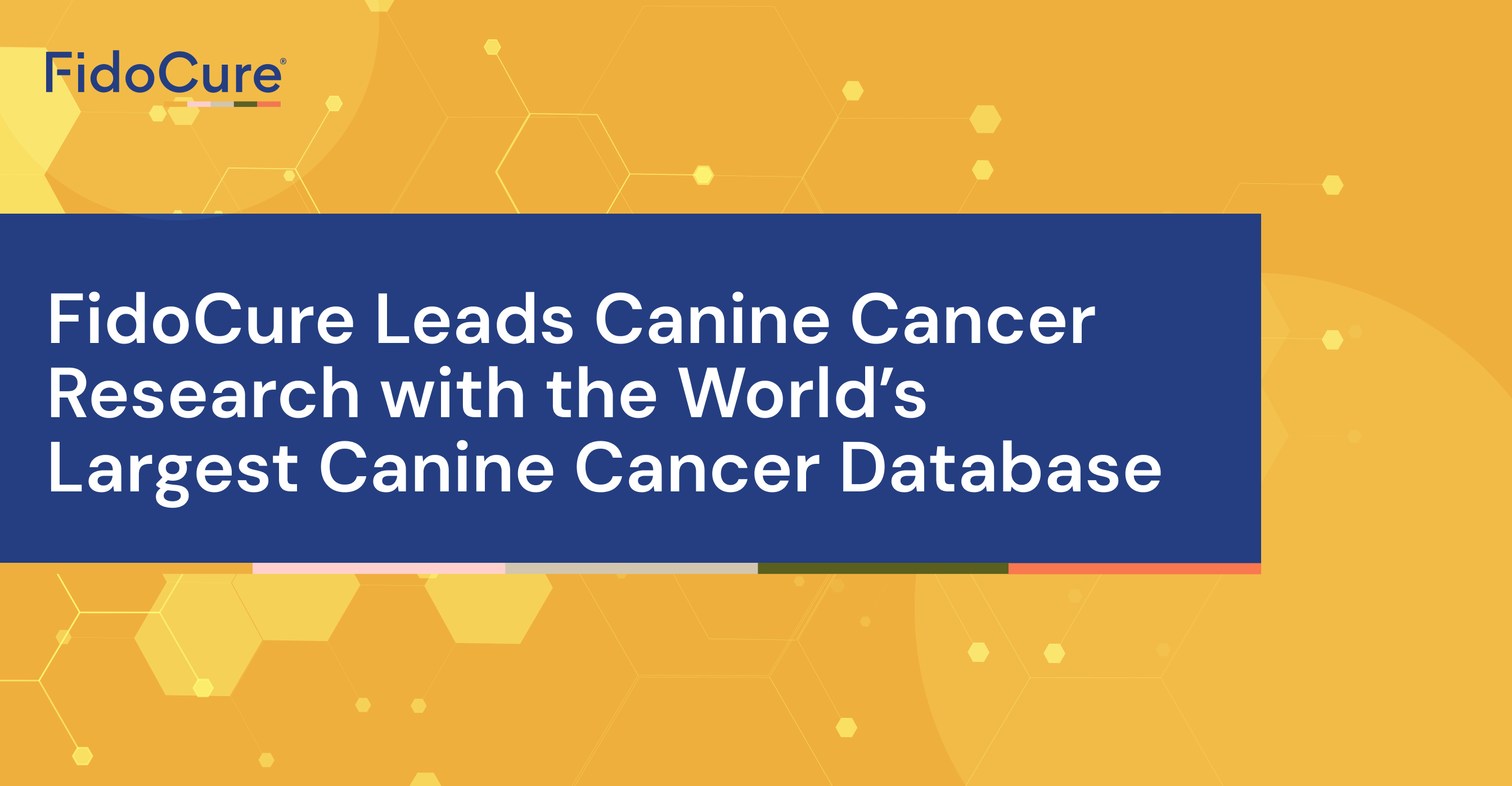Interview with Renowned Oncologist and Former FDA Leader Amy Abernethy

FidoCure’s Founder and CEO Christina Lopes sat down with Verily's President and Chief Medical Officer, former Principal Deputy Commissioner of the FDA and globally recognized leader in real-world evidence, Amy Abernethy at this year's Lake Nona Impact Forum to discuss the groundbreaking work being done in comparative oncology.
It’s been almost 8 years since we first started this conversation with Amy, since then she has
been an integral part of our journey. Her guidance, mentorship and support have been
invaluable as we continue to build out our vision at FidoCure. Together, we are making a
difference in the fight against cancer on both sides of the leash.
Read the transcript below.
Christina Lopes
Hi, Amy. It's so great to have you here.
Amy Abernethy
So awesome to join you, Christina. We've been doing this together for a long time. But the story continues.
Christina Lopes
It continues. And here we are in Lake Nona. So back in 2017, we started talking about how to help pet dogs with cancer. Cancer is the number one killer of dogs—-6 million diagnosed just last year in the US. And by building a dataset and actually understanding and helping dogs we could actually help humans. And it seems like a bit of a wild idea then, right? .And there was at the time some evidence from comparative biology. Dogs and humans co-evolved, their cancer shared some similarities. We knew some contours and there was an opportunity to leverage the that there's no “doggy HIPAA,” as you like to say. And all sorts of aspects, even the regulatory framework being more elegant so we can do more. But at that point, in 2017, we had zero evidence that we would be able to enroll thousands of dogs and deliver precision medicine for dogs. Oh my god. We were just hearing about that a moment ago here at Lake Nona. And deliver at the point of care across thousands of vet clinics, collect the data very copiously. And lo and behold, we published in Nature that we’re improving outcomes pretty radically, and that these drugs designed for humans are working for dogs. So that's where we've been in this journey that we're so fortunate to have had you as a witness, as a mentor, as a guide. So from where you sit now, and you yourself are tracing many arcs. What do you think this could go? What's the biggest benefit for our humanity and our four legged friends?
Amy Abernethy
So as I think about the last number of years, but also what does it tell us about the future, the first thing that's pretty remarkable is in 2017, we were having this conversation around being able to provide a diagnostic for dogs, have that guide treatment so now we understand the details of the cancer and its molecular change, and that informs are their potential treatments already on the market that can be used for the dog. But the other thing that was important that we were talking about in 2017 and turned out to be true is that dogs then could be followed across time. And you could collect the data from pet parents, veterinarians, and others about what happened to the dog after that treatment. And that you could complete that loop, both from a treatment of the pet perspective, and a partnership with the pet parent, but then also, that you could complete that loop of understanding the relationship between dog treatment and outcome. That then allows you to build a really pretty remarkable dataset that now has those key details. And you're lined that up with human datasets like the information from Flatiron. That now allows you to start building the foundation, the landscape, for comparing dogs and humans and setting up essentially, an overall AI. It's now almost like a turbocharged evaluation and innovation vehicle ready to start to think about understanding treatments for dogs, understanding implications for treatments for people. And then also now starting to think about additional things such as treatments that we develop in dogs, do they apply to human cancers? Or vice versa? What about combining treatments? What about, for example, an immunoncology treatment plus a targeted agent? Yeah, that actually takes us to the third part, which I think is an interesting part of this story. I've always believed, and we talked about this way back when, that together with pet parents, there's an opportunity to build a essentially a testing ground doggy clinical trials that allow you to test those new agents, the combinations of agents, and be able to deliver that information for meaningful treatments again for dogs, but also as the starting point to treatments that then jump over into humans. And we do that already when we're developing new medicines for people we test them in mice. But it turns out that the dog model is actually much more powerful model than the mouse model. And so if we think about taking that platform, the server, the turbocharged platform that you've been developing, and now use that as the foundation for your clinical trials platform, it becomes the starting point. This is much more efficient jumping over into human studies. And I think that that's how the story is going to start to play out.
Christina Lopes
And imagine now with the world of personalized medicine, right, and everything you're saying about those combinations like biomarker driven combinations, it's really hard to figure all that out. Right. So now you have in pet dogs, for example, there are 6 million dogs diagnosed, right? It's the highest rate amongst all mammals. So we can really use all that power and, and help and accelerate basically the right drug for the right patient, two legged or four legged, right and get the outcome. So, Amy, I love this. And I see us as part of also your movement, your campaign, your campaign in clinical evidence resiliency.
Amy Abernethy
And being able to make sure that we have the mechanisms to do the studies clinically, and do so at scale. And thinking about our pet friends, essentially, as part of that overall infrastructure that we can call on at times of pandemic we can call on as we think about developing cancer treatments, we can call on as we think about developing for example, treatments for other illnesses that affect dogs and people such as immune illnesses and skin problems.
Osteoarthritis, Reno, absolutely. So with that, I thank you so much. And we also think together collaboratively with all the pet dogs and their pet parents that have been involved, right as the dog moved from the farm to the couch to the bed, they really are our best friends and really might really help us unlock a whole new future.

.png)
